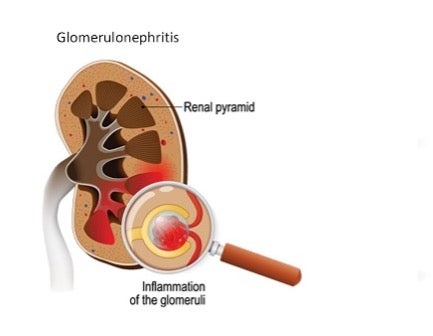About Glomerulonephritis
Glomerulonephritis happens when the kidneys' blood filters (glomeruli) become inflamed and scarred. This can lead to kidney failure if untreated.
Glomerulonephritis is one of two main groups of glomerular diseases. The second group is glomerulosclerosis, which is damage to the glomeruli caused by hardening and scarring of blood vessels.

Sometimes, one type of glomerulonephritis can lead to another type. For example, the acute type can eventually become chronic. The acute or chronic types can become rapidly progressive glomerulonephritis. There are many reasons this can happen. Sometimes, it’s due to a change in health. Other times, it’s due to another infection or injury. It’s important to keep on top of your health and let your healthcare team know if you notice any sudden changes in your health or notice any new symptoms.
Signs and Symptoms
Signs and symptoms of glomerulonephritis may include:
- Protein in the urine (albuminuria/proteinuria)
- Blood in the urine (hematuria)
- High blood pressure
- Swelling of your ankles or face (edema)
- Frequent nighttime urination
Foamy urine can mean there is protein in the urine (albuminuria/proteinuria). Dark or cola colored urine can be a sign of blood in the urine (hematuria). Certain medicines and food colorings can also cause dark colored urine. Speak with a healthcare professional if you aren't sure of the cause.
Causes
Glomerulonephritis can have many causes. The acute (sudden) type is often caused by an infection, such as strep throat (caused by streptococcus, a type of bacteria). It can also be caused by other infections, including pneumococcus (another type of bacteria), chickenpox (varicella, a type of virus), malaria (a type of parasite), and others. This is known as post-infectious glomerulonephritis.
The acute type can also be caused by other illnesses, including membranoproliferative glomerulonephritis, immunoglobulin A (IgA) nephropathy, lupus, Goodpasture syndrome, and many others.
Many of these diseases are caused by changes in the body's immune system that can damage kidneys. The immune systems helps the body fight off infections. However, with certain diseases, the immune system attacks healthy cells instead. With glomerulonephritis, damage to the glomeruli (kidneys’ blood filters) by the immune system causes them to lose their ability to remove wastes and extra water. Blood and protein can also be lost in the urine. Nephrotic syndrome means very high amounts of protein are being lost in the urine.
The chronic types can be caused by the same disease that can cause the acute type. Sometimes, chronic glomerulonephritis is caused by Alport syndrome, an inherited genetic disease that damages the kidneys.
In some cases, glomerulonephritis can be caused by certain drugs. For example, analgesic nephropathy is caused by heavy and prolonged use of certain pain relievers (analgesics), including the nonsteroidal anti-inflammatory drugs (NSAIDs), like ibuprofen and naproxen.
Complications
Acute (sudden) glomerulonephritis can be temporary and reversible, or it may get worse. Chronic or rapidly progressive glomerulonephritis can lead to chronic kidney disease (CKD) or kidney failure.
Diagnosis
In many cases, the first clues of glomerulonephritis are any signs and symptoms, such as finding protein and blood in your urine. Blood and urine tests can also check for signs of kidney damage. A kidney biopsy and other tests may also be needed.
Tests
Urine and blood tests can check for signs of kidney disease. Estimated glomerular filtration rate (eGFR) is a blood test that checks how well the kidneys are filtering your blood.
A urine albumin-to-creatinine ratio (uACR) is a urine test that checks for high protein (albumin) in your urine, which is a sign of kidney damage.
A urine protein-to-creatinine ratio (uPCR) may be used for certain kidney diseases. This test is similar to the uACR test, which measures albumin. Instead of measuring only the amount of albumin in your urine, it measures all the different proteins that may be present.
Genetic testing may be used to find out if a person has a gene variant (change) linked to certain genetic or inherited kidney diseases. Gene testing can be ordered by a physician or genetic counselor. A genetic counselor is a healthcare professional with special training in genetics and genetic diseases. They can help answer questions about the test and its results. The decision to have a genetic test is made in consultation with a healthcare professional.
A kidney biopsy is used to confirm a diagnosis of glomerulonephritis. A kidney biopsy is a test in which one or more tiny pieces (samples) of your kidney is removed and then looked at with special microscopes. The microscopes make it possible to see the samples in greater detail.
Imaging tests (such as an ultrasound, or CT scan) may be used if more information is needed for a diagnosis.
You may also need additional tests to monitor other conditions related to kidney disease.
Treatment
Overview
Treatment will depend on the cause or type of disease you have. Your healthcare team will work with you to create a treatment plan to help prevent kidney disease or keep it from getting worse. Certain nutrition and lifestyle recommendations and medicines may be involved. Be sure to keep up with medical visits. Glomerulonephritis can lead to kidney failure, which is treated with dialysis or a kidney transplant.
Medications
The exact medicines that will be used depends on the disease causing the glomerulonephritis. Sometimes, the dose might need to be changed, or a different medicine might be used. Before taking any over-the-counter medicine or supplement, ask your healthcare team which ones are safe to use.
You may need a blood pressure drug called an ACE inhibitor or an ARB. These two drugs control high blood pressure and reduce the amount of protein in the urine.
Diuretics (water pills) are used to remove extra fluid from the body (edema).
If needed, drugs such as prednisone (or other steroids) may be used. Prednisone is a type of immunosuppressant, which is a drug that suppress or "calms" the immune system (body’s defense system). This can keep the immune system from hurting the kidneys. Other immunosuppressants may also be used.
Nutrition
People with glomerulonephritis may need to follow a healthy diet that is low in salt and cholesterol. Reducing sodium (salt) in your diet can help lower blood pressure and control swelling (edema). Lowering cholesterol in your diet can help reduce the risk for heart disease. You might also need to lower your fluid and water intake. It is important to work with a registered dietitian to discuss any changes needed in your diet.
Questions to Ask
- Am I at risk for glomerulonephritis?
- Should I be tested for glomerulonephritis?
- Are there any changes I need to make with my diet? If so, can you please refer me to a dietitian to help me with my diet?
- Do you recommend any changes with my medications?
- What else can I do to prevent glomerulonephritis or keep it from getting worse?

















